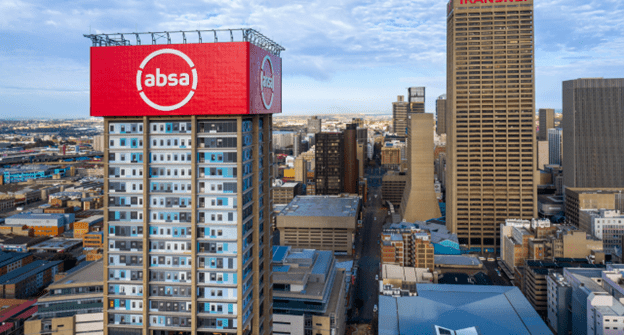- SA retail portfolio improves
- Anticipates improvement in 2nd-half earnings
2024 interim results salient points
- Revenue increased 3percent to R53.7 billion
- Operating costs increased 8percent to R28.3 billion
- Cost-to-income ratio increased to 52.7percent from 50.6percent
- Pre-provision profit declined 1percent to R25.4 billion
- Impairments charge in line with prior year
- Headline earnings decreased 5percent to R10.2 billion
- Return on equity declined to 14percent from 15.7percent
- Group CET 1 ratio of 12.7percent remains well above regulatory requirements
- Dividend per share flat at 685 cents
Absa Group reported headline earnings of R10.2 billion for the first half of 2024 and said it expects an improvement in second-half Group performance as its South African retail businesses demonstrated earnings growth across the portfolio in the first six months of the year.
“All of our underlying businesses in the South African retail portfolio reported headline earnings growth, which is indicative of recovery in business performance,” said Arrie Rautenbach, Absa Group Chief Executive Officer.
“While economic conditions remain challenging, our delinquency profile has stabilised as a result of the decisive action we have taken. We remain committed to our integrated strategy, a focus on seamless customer experience, and delivering sustainable, balanced growth and value creation.”
The Group’s Product Solutions Cluster (comprising home loans, vehicle asset financing, insurance, advisory and more) in South Africa, reported a 7percent increase in headline earnings. Everyday Banking (card, personal loans and transactions in SA) headline earnings grew 9percent, while Relationship Banking (SME, commercial and private wealth in SA) headline earnings rose 1percent.
The Group’s Absa Regional Operations retail and business banking (ARO RBB) cluster reported a 12percent decline in headline earnings as exchange rates negated gains. The business posted an 11percent increase in constant currency revenue, underscoring the value of the ARO portfolio as a source of growth and diversification.
The Group’s Corporate and Investment Banking Pan African unit reported headline earnings largely unchanged from a high base a year earlier as higher impairments impacted earnings in the period under view.
Total Group headline earnings declined 5percent from a high base a year earlier, after cost increases outpaced revenue growth. The five-year compounded average growth rate in diluted headline earnings per share is 6percent.
The Group’s capital and liquidity position remains healthy, with key metrics within the Group’s risk appetite and above the required regulatory minimum levels. The Group’s balance sheet remains robust, with a Common Equity Tier 1 (CET 1) ratio of 12.7percent. “We anticipate a stronger performance in the second half of 2024, also as we see further improvement in our credit losses and stronger non-interest revenue generation,” said Deon Raju, Absa Group Financial Director.
Absa’s active customer base expanded by 3percent to 12.5 million in the first half while the number of digitally active customers increased by more than 12percent to 4.3 million as the Group drove digital channel usage.
The Group also noted improved client experiences. Customer experience scores in the South African retail portfolios improved compared to a year earlier. Absa had the lowest number of formal complaints lodged with the Ombudsman in South Africa of the five largest banks in 2023 and reported a decline in the number of complaints.
“Our ongoing investments in digital innovation, customer experience enhancement and our repositioned brand are key drivers for future growth and operational excellence,” said Rautenbach.
Absa has also made significant progress in non-financial performance metrics including sustainability, as the Group continues to deliver against its ambition to be an active force for good. The Group has arranged R96 billion in sustainable finance deals since 2021 and is on track to exceed its target of R100 billion by 2025.
Based on the interventions in place, and excluding major unforeseen macroeconomic, or regulatory developments, Absa expects an increase in full-year revenue by mid-single digits. This will support stronger pre-provision profit growth and, together with a lower credit loss ratio than in the first half, should also support better second-half earnings growth off a low base in the second half of 2023.










